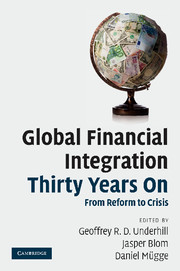Book contents
- Frontmatter
- Contents
- List of figures
- List of tables
- Notes on contributors
- Preface
- Acknowledgements
- List of abbreviations
- Introduction: the challenges and prospects of global financial integration
- Part I History and context: input, output and the current architecture (whence it came)
- Part II Assessing the current financial architecture (how well does it work?)
- 5 Adopting international financial standards in Asia: convergence or divergence in the global political economy?
- 6 The political economy of Basel II in the international financial architecture
- 7 The catalytic approach to debt workout in practice: coordination failure between the IMF, the Paris Club and official creditors
- 8 Empirical evidence on the new international aid architecture
- 9 Who governs and why? The making of a global anti-money laundering regime
- 10 Brazil and Argentina in the global financial system: contrasting approaches to development and foreign debt
- 11 Global markets, national alliances and financial transformations in East Asia
- Part III Does the future hold? Reactions to the current regime and prospects for progress (where is it going?)
- Conclusion: whither global financial governance after the crisis?
- References
- Index
5 - Adopting international financial standards in Asia: convergence or divergence in the global political economy?
Published online by Cambridge University Press: 02 December 2010
- Frontmatter
- Contents
- List of figures
- List of tables
- Notes on contributors
- Preface
- Acknowledgements
- List of abbreviations
- Introduction: the challenges and prospects of global financial integration
- Part I History and context: input, output and the current architecture (whence it came)
- Part II Assessing the current financial architecture (how well does it work?)
- 5 Adopting international financial standards in Asia: convergence or divergence in the global political economy?
- 6 The political economy of Basel II in the international financial architecture
- 7 The catalytic approach to debt workout in practice: coordination failure between the IMF, the Paris Club and official creditors
- 8 Empirical evidence on the new international aid architecture
- 9 Who governs and why? The making of a global anti-money laundering regime
- 10 Brazil and Argentina in the global financial system: contrasting approaches to development and foreign debt
- 11 Global markets, national alliances and financial transformations in East Asia
- Part III Does the future hold? Reactions to the current regime and prospects for progress (where is it going?)
- Conclusion: whither global financial governance after the crisis?
- References
- Index
Summary
The last major wave of emerging market crises triggered a global reform project, led by the USA and UK, to bring financial regulation in emerging countries into line with the regulatory standards and practices prevailing in the major countries. As noted in the introductory chapter, emerging market and developing countries had little input into the development of these international standards. Although such standards therefore lacked substantive input legitimacy, the asserted and increasingly widely perceived superiority of the Anglo-Saxon approach to financial regulation and governance gave them a wider degree of output legitimacy. This was certainly the assumption of the G7 countries and the major international financial institutions (IFIs), which put considerable effort into the global dissemination and implementation of international standards and codes on the assumption that this would strengthen the weakest link in the global financial system. This assumption was also shared by many important actors in emerging countries, notably in Asia, who saw the adoption of international standards as a means of importing superior regulatory practices and restraining what they saw as destructive behaviour in their domestic political economies. How successful has this ambitious regulatory reform project been?
In this chapter, I argue that the quality of financial regulation in some emerging market countries has improved considerably since the 1990s, but that there has not been systematic convergence upon western regulatory standards.
- Type
- Chapter
- Information
- Global Financial Integration Thirty Years OnFrom Reform to Crisis, pp. 95 - 112Publisher: Cambridge University PressPrint publication year: 2010
- 1
- Cited by



